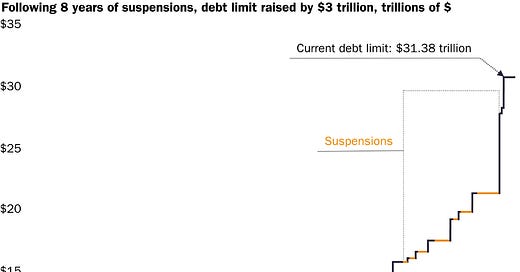Here are this week’s reading links and fiscal facts:
Fiscal-policy brinkmanship might be the only thing that can save us from economic catastrophe argues Kevin Hassett. “If we don’t change the trajectory of our fiscal policy soon, we will inevitably suffer a Weimar Germany-style collapse of our currency.” Read about Boccia’s commonsense benchmarks to control spending before raising the debt limit here.
Changes to House rules limit new spending. As the Congressional Research Service (CRS) explains, H.Res. 5, reinstates so-called “CUTGO” which requires any increases in mandatory spending (primarily entitlements) be offset with cuts. The resolution further requires the Congressional Budget Office to include macroeconomic effects and inflation in legislative cost estimates. Lastly, H.Res. 5 instructs committees to identify programs with lapsed authorizations, a.k.a. zombie appropriations, and recommend which mandatory or entitlement programs should be recategorized as discretionary spending so they become subject to annual reviews.
Congress gave its members a pay raise. The Select Committee on the Modernization of Congress included a new housing reimbursement policy that could amount to an additional $34,000 to support individual lawmakers’ living expenses while in D.C. Given budgetary dysfunction, the American people would be better served by a Congress that was subject to performance-based pay. One example: a No Budget, No Pay Rule.
What it takes to balance the budget. The Committee for a Responsible Federal Budget (CRFB) reports that all spending would need to be cut by 26% to achieve balance within a decade. “Necessary cuts would grow to 85 percent if defense, veterans, Social Security, and Medicare spending were off the table.”
Contingency plans to avoid a U.S. default. The US is projected to pass the $31 trillion debt limit today (see the chart below to understand how we got here). Treasury Secretary Yellen will begin using “extraordinary measures”, such as suspending investments in savings plans for government workers, to delay the exhaustion of federal funds until June. Meanwhile, House Republicans are formulating a plan to direct the Treasury to prioritize certain payments if a deal can’t be reached. Read Boccia’s commentary on how the Treasury Secretary can maneuver at the debt limit without causing the government to default on bondholders here.




